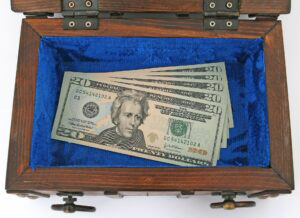When you hear about someone being a millionaire, you typically don’t picture them as being frugal. The phrase, “Frugal millionaire” is not something that typically goes together such as a peanut butter and jelly sandwich does.
But, if you’ve read books such as “The Millionaire Next Door” and Chris Hogan’s new book, “Everyday Millionaires,” you’d have a different outlook on how millionaires actually live.
Occasionally, when someone hears that a person is frugal, they automatically think that they’re cheap. Being frugal and cheap are two different things.
So, before we discuss the habits of a frugal millionaire, let’s look at the difference of being frugal versus cheap.
What Is Frugal Living?
Frugal living is simply being intentional with your money. It’s mainly practiced by those who aim to:
- cut expenses
- have more money
- get the most they possibly can from their money
Frugal people understand that paying more doesn’t necessarily mean better value. Again, just because someone is frugal, doesn’t mean they’re cheap.
Are Frugal People Cheap?
I know cheap people and I can tell you firsthand that they’re NOT fun to be around. Cheap people think that EVERYTHING is overpriced.
The bottom line is that these are people who don’t like to spend money. They complain to everybody about how much stuff costs.
Unfortunately, many cheap people I know also lack honesty and moral principles.
The reason I wanted to differentiate between being frugal and cheap is that the majority of research on millionaires concludes that they’re frugal. They put people above money and are known to give to worthy causes.
If you’re not yet a millionaire (keep reading the DFD posts and you’ll soon be one!) and want to know just how many exist out there, let’s move on to some stats…
Millionaire Statistics
Here’s a few millionaire stats you may not know about from millionairefoundry.com:
- There are 42.2 million millionaires worldwide, up 2.3 million over the last 12 months.
- Of those, 41% or 17.3 million individuals are in the United States
- This means that 7% of the U.S. adult population are millionaires
- Approximately 14% of U.S. households are in the millionaire club
- If you’re a millionaire, you’re in the top 0.6% of wealth for the world’s population
- The nine cities with the most millionaires, in decreasing order are Tokyo, New York City, London, Paris, Frankfurt, Beijing, Osaka, Hong Kong, and Shanghai
- Current projections are that 1,700 new U.S. millionaires are made every day
Let’s find out what it takes to become a frugal millionaire…
7 Unexpected Habits Of A Frugal Millionaire
1) They understand it’s not about what you make, it’s about what you SAVE
In Chris Hogan’s “Everyday Millionaires” book, his research found that 79% of millionaires reached millionaire status through their employer-sponsored retirement plan.
They have a certain amount automatically taken out of their check each month which allows them to “set it and forget it.”
What this means is this: If your employer offers a retirement plan (ex: 401k) with a match, focus on investing in it first, before investing in anything else.
Whatever you do, don’t touch it until you’re at least 59.5. Taking money out of your 401(K) early can have some serious consequences.
2) They don’t have a high income
Most frugal millionaires choose their careers based on their interests and not so much on potential future earnings.
Here are some stats regarding their income from the book, “The Millionaire Next Door.”
- 1/3 never had a six-figure income in a single working year
- Only 31% averaged $100k/year
- Only 7% averaged $200k household income over the course of their career
As a doctor or other white collar professional, you’ve got no excuse as your income potential is much larger than the “average millionaire.”
3) They don’t believe in “getting rich quick”
According to Tom Corley’s research on RichHabits.net, it took a minimum of 32 years for someone to acquire millionaire status.
What’s even more compelling is the age in which they became millionaires.
Here’s the breakdown from Corley’s study:
- 1% became wealthy before the age of 40
- 3% became wealthy between age 40 and 45
- 16% became wealthy between age 46 and 50
- 28% became wealthy between age 51 and 55
- 31% became wealthy between age 56 and 60
- 21% became wealthy after the age of 60
There are many people touting getting rich quick before the age of 40. Take a look above of how many actually do it.
Instead of focusing on risky investments, stick with index funds and realize that saving the first million is going to take a bit longer than one most think.
But remember, after you’ve got the first million in the bank, compound interest allows you to get to the second one MUCH faster. 🙂
Also remember that time is on your side. The younger you start, the longer you have to see your money compound over time.
Here’s what Dave Ramsey has to say about this:
Saving only $100 per month from age 25 to age 65 at 12% growth = $1,176,000. Everyone should retire a millionaire!
4) Ignore the Joneses
Frugal millionaires don’t give much thought to what others think about what they wear or drive. Most purchase their vehicles used and make it a practice to live the Stealth Wealth life.
They understand that money and stuff won’t make them happy and trying to keep up with the Joneses is a lost cause. They are content with what they have and are typically humble.
Think about how many stories you’ve heard about people that are millionaires that “don’t” look the part.
The Apostle Paul said it best (even from a jail cell):
Philippians 4:11-13 Not that I speak from want, for I have learned to be content in whatever circumstances I am. I know how to get along with humble means, and I also know how to live in prosperity; in any and every circumstance I have learned the secret of being filled and going hungry, both of having abundance and suffering need. I can do all things through Him who strengthens me.
5) Live below their means
Living below their means is what makes the frugal millionaire frugal! This ties into living the stealth wealth life.
It only makes sense that most in this group didn’t get rich by spending their money. They got rich by saving their money and making smart money decisions.
Now I realize that some people are better at saving than others. For instance, in our household, you guessed it, I’m the saver and Mrs. Debt-Free is the spender.
This is true for most married couples I know. Opposites attract, right? By both being different, this helps to balance out the relationship and occasionally test each other.
Just because someone isn’t a natural saver doesn’t mean they can’t learn to do so. Frugal millionaires develop their habits over a long period of time. And once they reach millionaire status, they continue practicing these “living below their means” habits because they’ve become ingrained in them.
6) Spend money on experiences and not things
In Jonathan Clements’s book, “How To Think About Money,” he stated that:
“We aren’t very good at figuring out what will make us happy.”
He also talked about experiences and that most people place too high a value on possessions and NOT enough on experiences.
Regarding income, we know from a 2010 Princeton study that happiness rises along with income until you hit about $75,000 a year (which is about what most need to cover their basic needs).
After that, income doesn’t appear to matter much.
Maybe it’s for this reason that frugal millionaires typically spend their money on experiences instead of buying things that aren’t going to bring us much happiness.
Personally for our family, I’m by far the MOST happy when I can take my crew on trips. Some of our best moments have been where they least expected it.
Last summer, we visited beautiful Yellowstone Park. Initially, our kids weren’t too keen on not being able to use their electronic devices.
Little did they know what awaited them out in the great outdoors. While there, we never turned on a TV and they claim that was the best vacation they’ve been on.
I would much rather avoid the hedonic treadmill and spend money on treating my family on a Yellowstone trip rather than buying stuff that they won’t care about shortly after they get it.
7) They avoid debt
One of the biggest myths out there is that millionaires leverage debt to invest.
Now, this may be true with the “flashy” type, but not so with the frugal ones.
This group avoids debt at all costs and only make purchases for items that they can actually pay for.
If they want to buy a car or go on a Disney cruise, they save up and pay cash for it later.
For those that do use a credit card to make purchases, they’re certain that they have enough money to pay off their bill in full.
Your Turn
Now it’s your turn. Your income is your biggest wealth-building tool. I see too many people hanging on to their student loans because the interest rate is low or finance a car at 0%.
Debt is the biggest obstacle to building wealth.
Life is going to continue to get it in the way with houses, cars, boats, private school, country club dues, four-wheelers, and more.
Sending money to banks to pay interest will keep you poor forever.
Focus on getting out of debt and then invest those previous payments.
You’ll experience financial freedom in no time!
Financial Coaching
Interested in financial coaching?
Email: [email protected]





